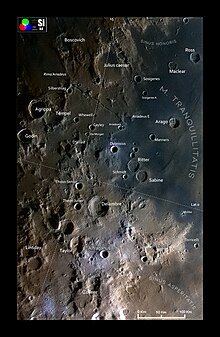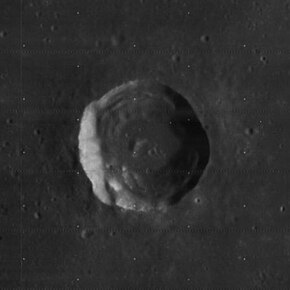Ross is a lunar impact crater that is located in the northwest part of the Mare Tranquillitatis. It was named after James Clark Ross (British explorer) and Frank E. Ross (American astronomer and optician).[1] It lies south-southwest of the crater Plinius, and northeast of the lava-flooded Maclear.

 Lunar Orbiter 4 image | |
| Coordinates | 11°42′N 21°42′E / 11.7°N 21.7°E |
|---|---|
| Diameter | 24 km |
| Depth | 1.8 km |
| Colongitude | 338° at sunrise |
| Eponym | James C. Ross and Frank Elmore Ross |
This crater has a generally circular shape, but is not quite symmetrical. The inner walls slope down to a base of slumped material, before joining a relatively level interior floor. There is a low ridge to the west of the crater midpoint.

Satellite craters
editBy convention these features are identified on lunar maps by placing the letter on the side of the crater midpoint that is closest to Ross.
| Ross | Latitude | Longitude | Diameter |
|---|---|---|---|
| B | 11.4° N | 20.2° E | 6 km |
| C | 11.7° N | 19.0° E | 5 km |
| D | 12.6° N | 23.3° E | 9 km |
| E | 11.1° N | 23.4° E | 4 km |
| F | 10.9° N | 24.2° E | 5 km |
| G | 10.7° N | 24.9° E | 5 km |
| H | 10.2° N | 21.8° E | 5 km |
References
edit- ^ "Ross (lunar crater)". Gazetteer of Planetary Nomenclature. USGS Astrogeology Research Program.
- Andersson, L. E.; Whitaker, E. A. (1982). NASA Catalogue of Lunar Nomenclature. NASA RP-1097.
- Bussey, B.; Spudis, P. (2004). The Clementine Atlas of the Moon. New York: Cambridge University Press. ISBN 978-0-521-81528-4.
- Cocks, Elijah E.; Cocks, Josiah C. (1995). Who's Who on the Moon: A Biographical Dictionary of Lunar Nomenclature. Tudor Publishers. ISBN 978-0-936389-27-1.
- McDowell, Jonathan (July 15, 2007). "Lunar Nomenclature". Jonathan's Space Report. Retrieved 2007-10-24.
- Menzel, D. H.; Minnaert, M.; Levin, B.; Dollfus, A.; Bell, B. (1971). "Report on Lunar Nomenclature by the Working Group of Commission 17 of the IAU". Space Science Reviews. 12 (2): 136–186. Bibcode:1971SSRv...12..136M. doi:10.1007/BF00171763. S2CID 122125855.
- Moore, Patrick (2001). On the Moon. Sterling Publishing Co. ISBN 978-0-304-35469-6.
- Price, Fred W. (1988). The Moon Observer's Handbook. Cambridge University Press. ISBN 978-0-521-33500-3.
- Rükl, Antonín (1990). Atlas of the Moon. Kalmbach Books. ISBN 978-0-913135-17-4.
- Webb, Rev. T. W. (1962). Celestial Objects for Common Telescopes (6th revised ed.). Dover. ISBN 978-0-486-20917-3.
- Whitaker, Ewen A. (1999). Mapping and Naming the Moon. Cambridge University Press. ISBN 978-0-521-62248-6.
- Wlasuk, Peter T. (2000). Observing the Moon. Springer. ISBN 978-1-85233-193-1.
External links
edit- Ross at The Moon Wiki
- Media related to Ross (lunar crater) at Wikimedia Commons
- LTO-60B4 Ross — L&PI topographic map